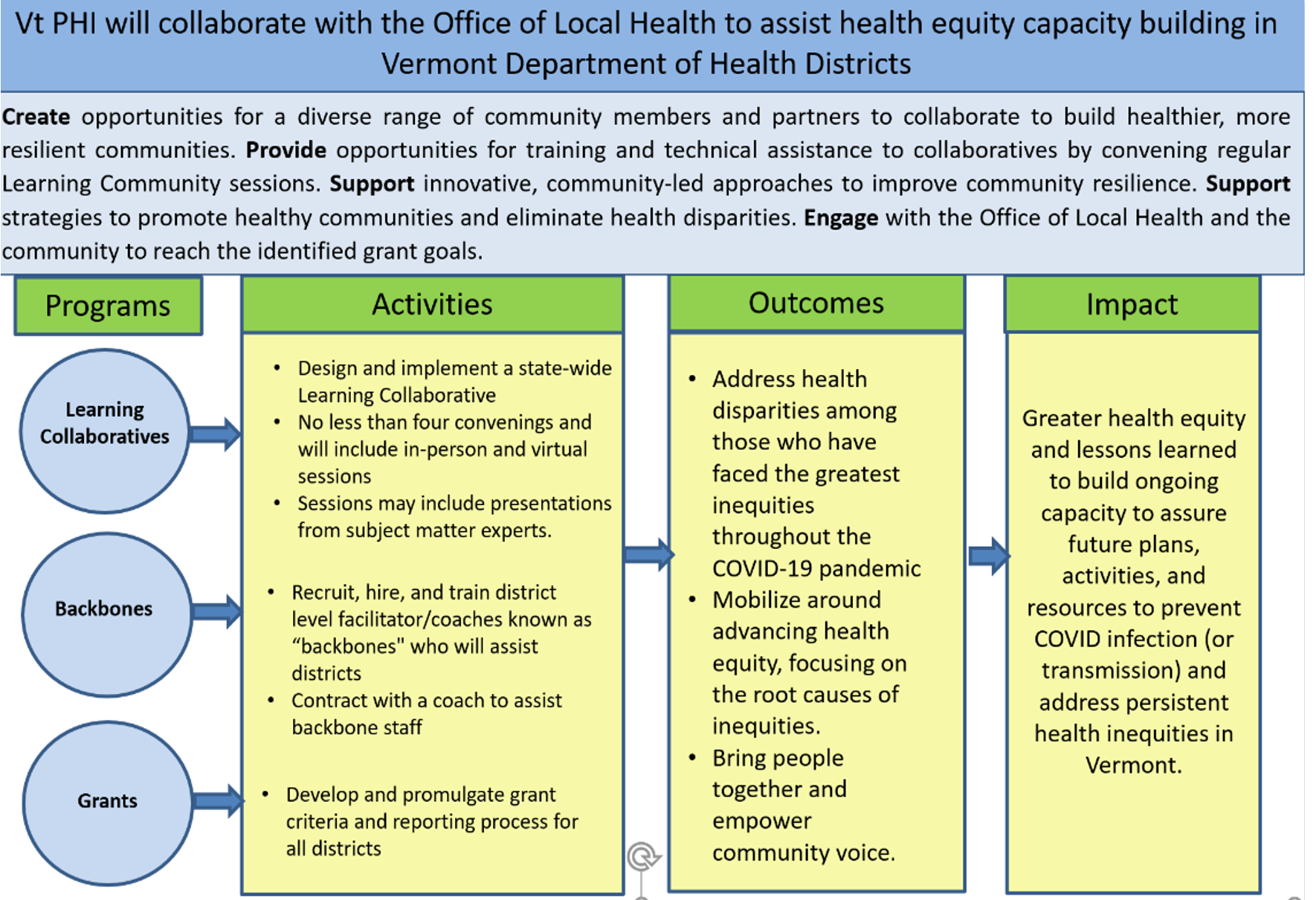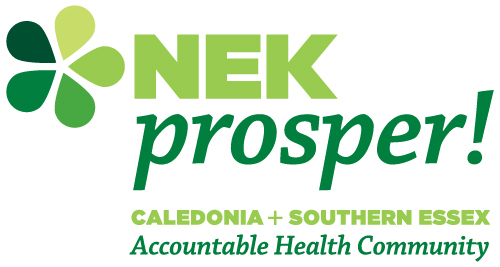Racial Equity Habit-Building Challenge
“Health Equity exists when all people have a fair and just opportunity to be healthy – especially those who have experienced socioeconomic disadvantage, historical injustice, and other avoidable systemic inequalities that are often associated with social categories of race, gender, ethnicity, social position, sexual orientation and disability.”
Vermont Department of Health (VDH) District Office: St. Johnsbury
District Director Lead: Heather Lindstrom
Designated Regional Community Group: NEK Prosper!
Regional Backbone Organization: Northern Counties Health Care, Inc.
Integrator: Kari White
Learning Collaboratives:
Learning collaboratives (also known as communities of practice, learning communities, learning networks, knowledge networks, and quality improvement collaboratives) bring teams of people together in a short-term, structured forum to create change and make improvements in a focused area. Collaboratives are built on social connectedness and shared learning in a way that supports both peer-to-peer learning and expert-to-peer learning.
The Action Learning Collaborative At-a-Glance:
- March 2022 – May 2023
- Statewide learning and sharing through webinars and in-person trainings
- Shared library system for documentation and cross-referencing
- Facilitated local team meetings
- One-on-one coaching as needed
- Goal: Provide information and resources to NEK Prosper! and the CANs to help build capacity to create a culture for equity.
- Objectives:
- Address health disparities among those who have faced the greatest inequities throughout the COVID-19 pandemic.
- Mobilize around advancing health equity, focusing on the root causes of inequities.
- Bring people together and empower community voices.
Reflective Questions to Build Health Equity Capacity and Guide the Collaborative Process – Contribute in IdeaBoardz
- What is my hope for this work in your district?
- What might be the biggest risk (or your greatest fear) around this work in your district?
- What roadblocks do you think currently exist?
- Who Benefits? Through our design decisions and actions, who will most directly benefit and how will they benefit?
- Who Pays/Is Harmed? Will our approaches lead to any unintended consequences that can be mitigated?
- Who Leads? Will our methods increase leadership opportunities for BIPOC communities and other disproportionately impacted communities?
- Who Decides? In what ways can be we more transparent in how decisions get made? Will our actions create different ways of operating that place more choice in the hands of those with lived experience?
Developing policies and procedures for the granting of stipends to individuals attending local collaboration meetings as well as virtual (and, potentially, in person) “All District” meetings. Stipends are intended for distribution to individuals who represent those with the most at stake in finding equitable solutions and aren’t paid to attend as part of their job.
- It is up to us to determine the process for distributing these stipends.
- We have examples of how other VT collaboratives have decided to do this.
1. Introduction to the VT Community Health Equity Partnership – March 29, 2022 – Slides and Notes
2. The Importance of Data: The Impact of COVID-19 on VT’s Vulnerable Populations – April 11, 2022 from 1:00-3:00pm
Join Zoom Meeting:
https://bostonu.zoom.us/j/91617411958?pwd=TFI5L21CdW9hNFBzaSttU0dGL1lwUT09
Meeting ID: 916 1741 1958, Passcode: 160387
Dial by your location: +1 646 876 9923 US (New York); Find your local number: https://bostonu.zoom.us/u/abi1A9dxkn
Session Pre-Work
Please bring your questions, thoughts and be prepared to talk about:
- What is another voice(s) to invite into this work?
- What are your next steps?
- Find your district’s most recent hospital-led Community Health Needs Assessment and review it.
- Think about the different kinds of data you could use besides quantitative data (stories, 1st person narratives, literature, art, etc.).
Backbones:
The backbone organization will provide the supporting infrastructure to coordinate work among partners and push forward the overall initiative. Based on the experience of similar efforts across the country, a robust backbone function is a key success factor to sustaining Collective Impact.
For the duration of this Agreement, Backbone funding Sub Recipient will support principles embodied in Collective Impact 3.0.
- The mobilization of a diverse group which must include the District Director and “individuals from populations at higher risk and that are underserved” and may include funders, sponsors, and other community stewards to support cross-sectoral work on health inequities
- The facilitation of participants’ inner journey of change, using not only Sub Recipient’s own skills, but also relying on assistance and coaching by Padgett Consulting
- Processes to cultivate trust and empathy among participants, while cultivating trust and empathy among community collaborative members so they can freely share perspective, engage in fierce conversations, while navigating differences in power.
Backbone funding Sub Recipient will provide the equivalent of a 0.5FTE (20 hours per week) staff support to the Vermont Department of Health District’s community collaborative to enable its work to address health inequities laid bare by the COVID-19 pandemic. In this work, the Sub Recipient will
- Guide Vision and Strategy
- Advance Policy
- Mobilize Resources
- Build Community Engagement
- Support Aligned Activities
- Establish Shared Measurement Practices Details of the role can be found at:
https://www.collectiveimpactforum.org/sites/default/files/Backbone%20Starter%20Guide.pdf
Backbone Staff (Integrator)
The Vermont Public Health Institute is hiring 12 Backbone Staff (Integrator), one for each Department of Health District, each to be contracted for 20 hours weekly for the duration of the CDC COVID Health Equity Grant.
The VtPHA and VTPHI are working to build infrastructure and a public health presence in Vermont that promotes the health and wellbeing of all Vermonters and we are looking for an energetic individual who will be committed to working with consultants to achieve grant goals. Preference will be given to candidates who live in the community and reflect the community in terms of diversity and lived experience. This is a grant funded position that will end when the grant ends in 2023. Hourly salary commensurate with skills and experience.
The Backbone (Integrator) Staff will work as coaches and facilitators:
- Use collective impact principles – a common agenda, shared measurement systems, mutually reinforcing activities, continuous communication – to facilitate alignment among multisector partners
- Assisting the community collaborative groups embed diversity, equity, and inclusion into the fabric of the local collaborative structure and operations
- Assisting the community collaborative groups engage residents in meaningful and authentic ways
- Assisting the community collaborative groups develop and implement system- change (not programmatic) strategies to achieve impact
Grants:
During the first forty-five days of this Agreement, Sub Recipient will work with the Vermont Department of Health’s District’s community collaborative to assist the collaborative in:
- Developing a draft “Data Driven Problem Statement” which the community intends to use to guide its work in addressing health inequities. This draft will be shared with all other districts on May 12, 2022.
- Developing policies and procedures for providing grants to the communities with the intent of accomplishing its work to address health inequities. This draft will be shared with all other districts on May 12, 2022.
- $150,000 in grant dollars per HSA
- In collaboration with VDH, VtPHI and Backbone Staff, NEK Prosper! will develop guidelines for grant funds distribution
- In collaboration with VDH, VtPHI and Backbone Staff, NEK Prosper! will develop guidelines for grant funds distribution.
- The fiscal agent for this piece of the work has not yet been determined. It does not have to be NCHC. Some districts are asking VtPHI to do this piece as it will require sub recipient monitoring.

